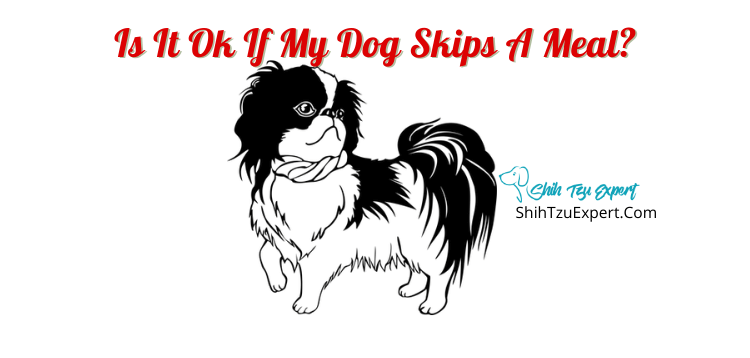If your dog has been refusing its dinner on multiple occasions, you might be wondering what’s wrong. Here, we’ll go over a few of the numerous causes of your dog skipping meals and when to call the vet.
Is It Ok If My Dog Skips A Meal?
For a variety of non-medical reasons, such as stress or a lack of interest in their food, dogs may skip meals. By including wet food in their meals, you can get them to eat more. Plan regular meals at least twice per day, and always make water available. If other symptoms arise, contact your vet immediately.

Why Is My Dog Not Eating But Acting Normal?
There is probably a straightforward solution if your dog is acting normally but still isn’t eating.
One reason why dogs stop eating is stress. Their appetite might be impacted by a change in their schedule or environment. Dogs occasionally stop eating when they become bored with the same food and wait for something more interesting and delectable to eat.
As long as they are hydrated and healthy (e.g., drinking plenty of water), g. overly fatigued, throwing up, having diarrhea, etc. ), then your dog will most likely start eating soon. However, if your dog is not eating and is either a puppy or an old dog, you should take them to the vet to be examined.
The notion that dogs will starve to death if they skip meals is a common one. Many pet parents notice their beloved puppy skip one or two meals and may feel as though they should call the veterinarian right away if he skips breakfast or dinner, or they may even overfeed at the next meal to make up for the calories missed.
In the wild, wolves do not eat every single day. Depending on the availability of their prey, weather conditions, and even the size and skill of their pack, they may not be able to secure fresh prey for several days at a time, or even a week or two. Their bodies have adapted well to this eating schedule, and they are able to function perfectly fine without a bowl of food in the morning and evening.
Although dangerous, long-term anorexia in dogs is a relatively uncommon condition. A dog’s inability to eat for an extended period of time is probably caused by an underlying medical condition. But most of the time, dogs just need to get a few missed meals out of the way, and they’ll be back to eating in no time.
Just as periodic fasting comes from the wild, so too does overeating—its exact opposite. This means sometimes this behavior shows up in our domesticated friends as well. However, too much food (or too much eaten too quickly) can be highly dangerous for dogs and should worry pet parents much more than skipped meals.
Although it is important for your dog to eat on a regular schedule, he may occasionally refuse food in order to revert to his wild instinct. Some breeds are better known for this than others; for instance, Siberian huskies and other northern breeds, in particular, occasionally engage in voluntary fasting for what appears to be no discernible reason. This could be partly explained by the fact that sled dogs occasionally only receive intermittent feedings, especially during the off-season.
FAQ
When should I worry about my dog not eating?
If there is any accompanying vomiting or diarrhea and your dog isn’t eating, see a veterinarian within 8 to 12 hours. If your dog isn’t eating, there are a few likely causes, including emotional problems, that go without these symptoms.
Why is my dog not eating randomly?
Dogs may stop eating due to environmental changes, stress, a negative drug reaction, and nausea. Dogs’ appetite loss can also be brought on by internal obstructions, pain, and dental issues.